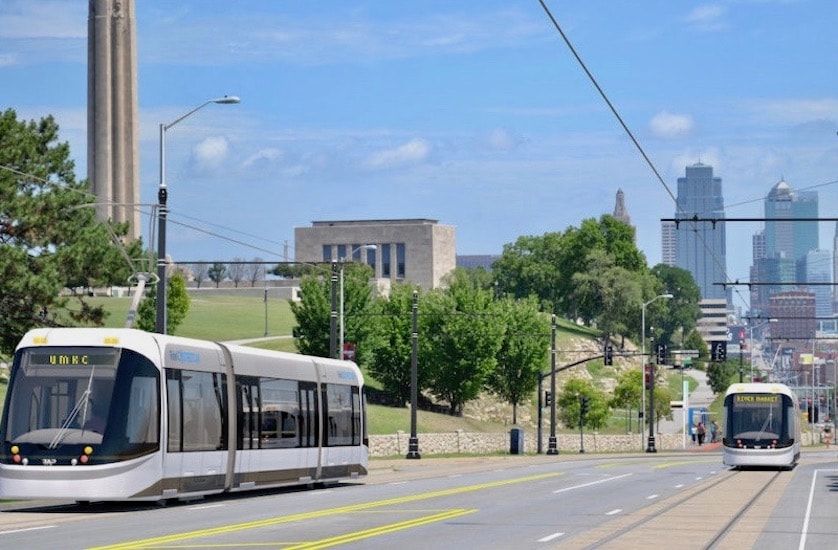Riding the Rails Into 2021

Published January 4th, 2021 at 1:15 PM
By Kevin Collison
What a difference a year makes.
One year ago, anticipation was high that greater downtown was poised for a major influx of office development including the Strata and Platform Venture projects, and the new Waddell & Reed headquarters.
The Loews Convention Hotel was only a few months from opening, new restaurants and brewpubs were popping up and several major apartment developments were in the works.
We all know how that worked out, thanks to Covid.
New office towers?
Not when most employees worked from home and companies were uncertain what the future would bring. Only the Waddell & Reed project started last spring and the year ended in uncertainty about its future use when the company was acquired.

Stillwell, the Loews lobby restaurant, had far fewer customers than anticipated after Covid slammed the convention and travel industry.
A month before Loews was scheduled to open, the pandemic hit and derailed the convention and travel industry. The new 800-room hotel, like every other hotel, struggled to get any kind of business, let alone the thousands of Shriners that had been anticipated.
The bright spot during Covid has been the continued strength of the residential market. The new City Club Apartments, REVERB, Second and Delaware and Artistry KC projects all opened, and several new apartment plans already are in the works this year.
Only Three Light, the long-anticipated third Cordish apartment tower, failed to break ground, and the company has been mum on when it finally will.
Which brings us to 2021.
The biggest and most far-reaching news was the announcement in early December the planned extension of the streetcar along Main Street from downtown to UMKC had been endorsed for its full $174 million in federal funding.
It’s hard to overstate what this will mean to the Main Street corridor of Kansas City over the next decade.
A big residential project, the Netherland and Monarch apartments near 39th and Main, has already been spurred by the planned extension, and properties are being snapped up along Main in anticipation of the streetcar.
At year’s end, two additional residential deals were revealed, a plan based on preserving the historic Katz Drug Store at Westport Road and Main, and a mixed-use project by Mac Properties at Main and Armour.

Rendering of renovated Katz Drug Store with apartment building behind it. (Rendering by Hoefer Wysocki architecture)
Word on the street is another big residential project is in the works at 45th and Main, where an entity listing the same address as Financial Holding Corp., the Merriman-controlled business, has purchased the former Holiday Inn with plans to demolish it.
On the edge of greater downtown, Troost Avenue between 24th Street and Armour has seen several new residential and commercial projects either completed or announced, bringing much needed investment to that long-neglected street.
Many people have greeted the reinvestment on Troost with enthusiasm since that stretch has historically been the symbol of Kansas City’s racial divide.
But it also has spurred backlash.
To some, the overdue decisions to redevelop long empty lots and vacant buildings along Troost into apartments and businesses is considered gentrification, a term that is often misused in Kansas City.
Nobody has been displaced by these new investments along Troost, either directly or indirectly.
While much more needs to be done to provide affordable housing along Troost and all over the city, including stepped-up support from the state, the kind of reinvestment now occurring has been a longtime goal and should be welcomed.
Which leads to a cloud hanging over the continued revitalization of greater downtown and potentially Main Street heading into the new year.
The 2501 Beacon Hill apartment development at 25th and Troost was part of a wave of reinvestment on Troost last year (Image by Trinity Animation)
The political climate at City Hall has become increasingly anti-development, reminiscent of the Funkhouser years.
The KC Economic Development Corp. has been gutted, and it seems that some appointees to development agency boards are more interested in critiquing developments for political reasons than objectively reviewing the commercial basis of their incentive request.
New legislation that would substantially restrict the use of property tax abatements as a development incentive has been introduced to the City Council, as well as financially unrealistic requirements for setting aside units for affordable housing.
It’s all part of that ‘zero-sum’ attitude that appears to increasingly be taking hold, pitting greater downtown and potentially the Main Street corridor, against the East Side.
There is no evidence that development will be pushed to the East Side if developers are denied incentives in greater downtown or other parts of the city.
What may happen is they’ll just quietly decide not to do business in Kansas City at all.
One example, according to sources familiar with the deal, was the recent decision by Urban Outfitters to build a 2,000-employee distribution center in western Wyandotte County rather than the former Bannister Federal Complex property near 85th and Troost.

A tentative design for the six-story One Nine Vine apartment and retail project proposed by a local development group, 1900 Vine Street LLC, for the 18th & Vine Jazz District (Image from 1900 Vine Street LLC)
Urban Outfitters was ready to choose Bannister, but company representatives became worried about the rhetoric which emerged last summer when BlueScope Construction sought additional city incentives to retain its operation in the West Bottoms.
The description of the BlueScope incentive request as an example of “systemic racism” by Dr. Bedell of the KC Public School District, coupled with the increasing negative atmosphere at City Hall, helped change the firm’s mind, sources say.
In the case of BlueScope, the firm decided to stay in the West Bottoms after the Council rejected its incentive request.
Urban Outfitters however, will be locating its much-needed jobs 25 miles away from Bannister, which is served by the Troost MAX, to a suburban location with poor public transit.
That being said, moving into 2021, high hopes are riding with the new streetcar extension and the continued interest of people who want to live in a pedestrian-friendly urban environment.
There’s also a new city manager, Brian Platt, who may help make the City Hall bureaucracy friendlier to people who want to open businesses and build here.
And perhaps when enough of us are inoculated, those stalled office projects will proceed, and prosperity will return to the hotel and food and beverage industry.
Did I mention, another new brewpub is headed to the River Market? Cheers!
Happy New Year!


